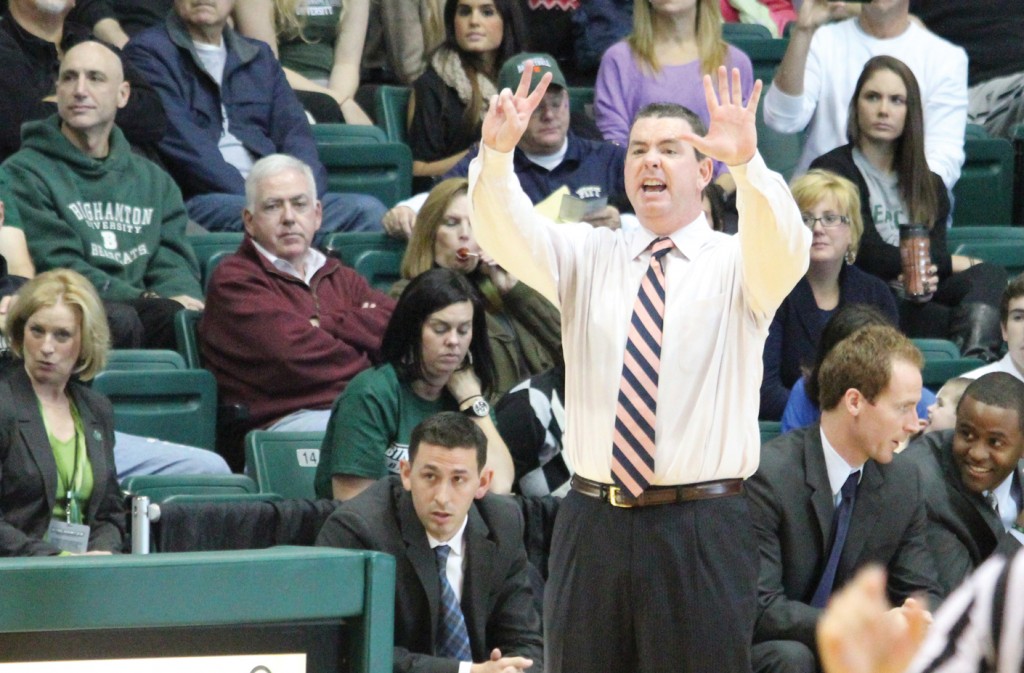
All the Beatles need is love. Tommy Dempsey, on the other hand, needs time and patience.
The first-year Binghamton University men’s basketball coach inherited an unenviable situation when he took the program’s helm in May. Since the 2009 scandal — which resulted in the dismissal of six players and the firing of then-head coach Kevin Broadus — Binghamton has fallen into college basketball’s purgatory.
The 2011-12 Bearcats found their first win 27 games into the season, finishing with just two victories overall, including the America East tournament play-in game win over University of Maryland, Baltimore County.
Things won’t change overnight, and this isn’t a video game, so you cannot simulate through the rough years. But Dempsey has made great strides already, blazing a path on the recruiting trail to sign four players to this year’s incoming class, which is an impressive feat, given that Dempsey only signed with Binghamton on May 24.
“Fast forward four months and I think we’re in a much better place than we were,” Dempsey said. “The roster changed over a lot, I had scholarships when I got here and it was late.”
Of course, one recruiting class won’t right the ship immediately, and players don’t improve at the snap of a finger. But while recruiting and player development require time, they might not be the most important factors for rebuilding a once-proud program. Steve Masiello, who inherited a six-win Manhattan College basketball team at the start of last season, stressed the importance of establishing priorities from day one.
“What you have to worry about is your culture, your attitude, and your players and what are you going to stand for, what are going to be the principles of your program,” he said. “That cannot be compromised.”
In his players, Masiello said he instilled a desire to be the “hardest-working team there was.” They espoused his creed and reeled off 21 wins in his first season, good for a plus-15 win differential.
Dempsey presented a similar plan.
“We have to feel like from the time we started workouts at the end of May until the time we play a game Nov. 9 that nobody outworked us,” he said. “I think that’s what we’re trying to build.”
Binghamton senior forward Taylor Johnston, who has been with the Bearcats since the close of the Broadus era, said the team has collectively exerted itself to new levels this preseason.
When asked if Dempsey’s conditioning workouts were the most demanding he has endured, Johnston said, “Definitely, because Coach Dempsey is a running coach. Our preseason was pretty tough, but we needed it.”
So Broadus and Mark Macon, who was fired in April, never pushed their players as much on the conditioning front. Sometimes, though, something as simple as a coaching change can invigorate a team and make the players buy into something new.
“When you get a new guy in there, sometimes it brings new life and the players get more excited about the change, especially when things weren’t going well beforehand,” said Steve Pikiell, who has built Stony Brook University’s men’s basketball team from a six-game winner into a perennial America East contender.
And, believe it or not, Stony Brook might have been mired in an even more unfavorable situation when Pikiell took over than Binghamton is right now. Though the Seawolves did not have a scandal on their record, they were on probation and had lost scholarships because they had the country’s lowest Academic Progress Rate, according to Pikiell. Compound that with limited success before transitioning from Division II, shoddy facilities and low attendance rates, and you have a long road to success.
“You just take one problem at a time,” Pikiell said. “Try to solve one thing at a time.”
By the end of Pikiell’s second year, Stony Brook’s probation had ended and the Seawolves had a full number of scholarships. Facility upgrades are still in the works, but by Pikiell’s fourth year, his team had finished above .500. In his fifth year, the Seawolves made the National Invitation Tournament (NIT).
Masiello, on the other hand, inherited a roster with latent talent and immediately bucked the losing trend at Manhattan despite the program’s mediocre facilities.
As for Dempsey, Binghamton appears to be somewhere in between the programs inherited by Pikiell and Masiello. The Bearcats’ scandal no longer affects scholarships, and throughout the team’s struggles, attendance has not faltered at the top of the America East. The Events Center is also one of the conference’s premier venues.
But Dempsey does not have the same type of talent Masiello had last year. These Bearcats, Dempsey said, are not deep — Manhattan routinely played 10 players for at least 10 minutes per game — and they don’t have a dominant scorer like George Beamon, who averaged 19 points per game on 48.6 percent shooting for Manhattan last year.
In time, Dempsey will sign talented recruits who fit his fast-paced style. He has already brought in a few such players. That’s not to say he will forget about the letterwinners from Macon’s team, though.
“You know, there’s always that natural division of is he going to move on from us,” Dempsey said of the returners. “I’ve let them know that I believe in them and I’m counting on them.”
But until Dempsey constructs his ideal roster, he’ll need time and patience.
“You don’t know when it’s going to finally click,” Masiello said. “You know it’s going to — the variable is just time.”


